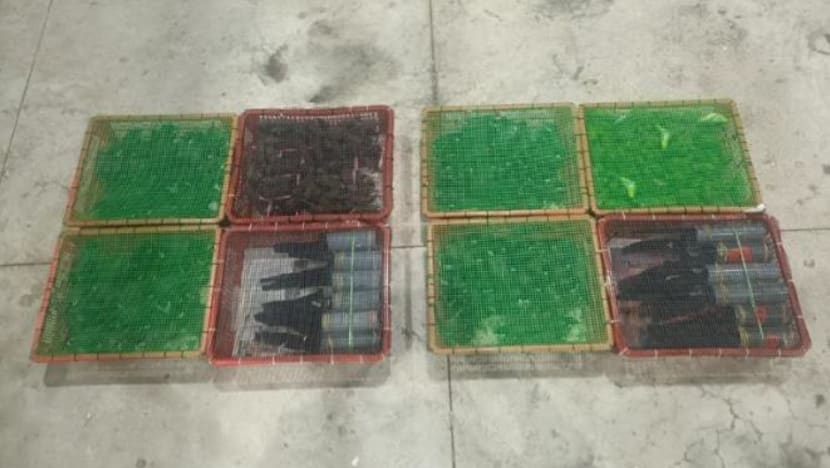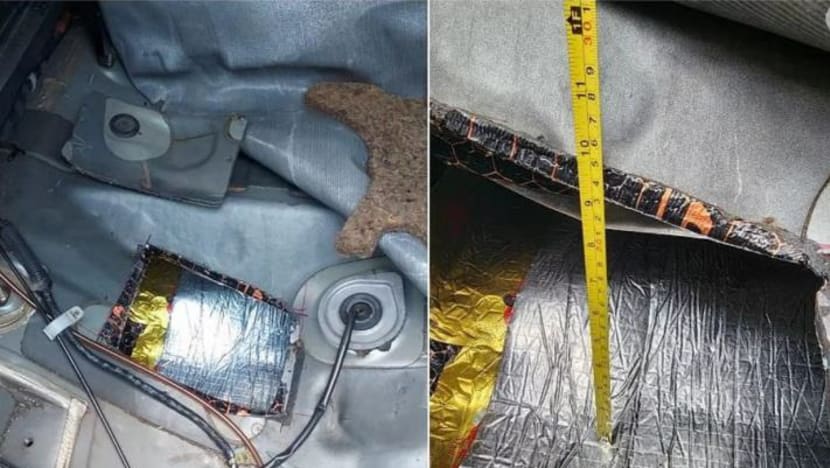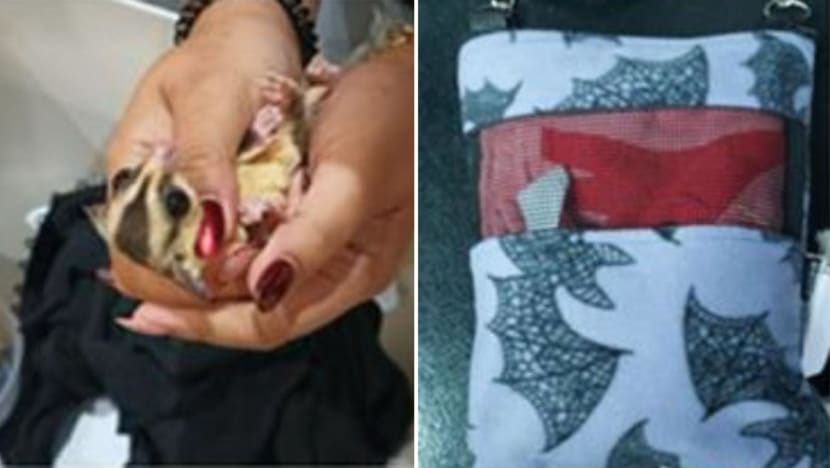Puppies, arowanas and axolotls: Over 30 cases of animal smuggling in 2023
Several of the attempts led to animal deaths and the transmission of viral diseases, say authorities.

Puppies smuggled into Singapore were often found hidden behind seats, in the boot or within modified compartments to avoid detection. (Photos: NParks)

This audio is generated by an AI tool.
SINGAPORE: Over 30 cases of pet animal or wildlife smuggling were detected at Singapore’s borders in 2023, the National Parks Board (NParks) and the Immigration and Checkpoints Authority (ICA) said on Tuesday (Jan 23).
One of the cases, involving the illegal importation of 337 birds, led to the highest sentence to date for animal smuggling in Singapore – 60 weeks' and 72 weeks' imprisonment respectively for the two involved parties.
Some of the animals, including three axolotls discovered at the Singapore Cruise Centre in December, are species protected under the Convention on International Trade in Endangered Species of Wild Fauna and Flora (CITES).
The first case of animal smuggling in 2024 also occurred 10 days into the new year, the authorities said in a joint media release.
ICA officers found five puppies and three kittens hidden in the spare tyre compartment during a vehicle inspection at Woodlands Checkpoint. The driver has been arrested.
CASES FROM 2023
NParks and ICA highlighted several smuggling attempts that were thwarted last year.
In March, eight boxes of birds were discovered in a Malaysia-registered vehicle at Tuas Checkpoint.
ICA officers found 24 White-rumped shamas, 97 Oriental-white eyes, 116 Red-whiskered bulbuls and 100 Scaly-breasted munia in plastic boxes hidden behind the driver and passenger’s seat.
A total of 138 of the 337 birds died within five days of the seizure, likely due to stress caused by the smuggling process, said the authorities.
Two of the men involved were sentenced to 60 weeks and 72 weeks in jail respectively. The court case against a third individual involved is still ongoing.

Many attempts were made to illegally bring puppies and kittens into Singapore.
In May, a Malaysian man was arrested at Woodlands Checkpoint for attempting to smuggle three puppies and a kitten, hidden inside a modified compartment under the passenger seat.
One of the puppies tested positive for canine parvovirus, a contagious virus affecting mainly dogs, and subsequently died.
The kitten was hidden in a nylon bag, which is unsuitable for the humane transportation of animals, said the authorities. The feline also later tested positive for feline parvovirus, a highly contagious virus found mainly in cats.
The man was later sentenced to 24 weeks’ jail.
The following month, another six puppies and two kittens were discovered inside a modified fuel tank compartment at Woodlands Checkpoint. Both kittens were also concealed in nylon bags.
The animals were found in weak condition with some bearing minor injuries. Authorities said that their young age likely exacerbated their suffering.
The transmission of canine parvovirus, which two of the puppies tested positive for, was also likely facilitated by the cramped conditions they were transported in, they added.
The smuggler, a Malaysian man, was given 26 weeks’ jail.

More attempts to smuggle puppies and kittens were uncovered in July, August and December, including one by a repeat offender.
The animals, uncovered at the Tuas and Woodlands checkpoints, were concealed under seats, in vehicle compartments or in the boot.
A number of the smuggled puppies and kitties also tested positive for viruses and subsequently died.
Jail terms were meted out to the individuals involved in the cases detected in July and August, while investigations into two cases from December are ongoing.
Sugar gliders and a tarantula, which are not allowed to be sold or kept as pets in Singapore, were found at the land checkpoints in November in three separate instances.
The tarantula, which was encased in a plastic container and kept in a person's bag, was detected by the Singapore Police Force's K-9 unit at Woodlands Checkpoint.
An attempt to illegally import an Asian arowana and three axolotls at the Singapore Cruise Centre was also foiled in December, with the confiscated animals now being cared for at NParks' Centre for Wildlife Rehabilitation.
EXOTIC WILDLIFE SPECIES
NParks said that it has been conducting islandwide enforcement operations against the illegal sale of animals and wildlife for the pet trade.
Over the past two years, raids were carried out on more than 50 premises resulting in the seizure of over 180 wildlife.
NParks said that the trading occurred on online platforms such as Telegram, where people would advertise various wildlife species for sale.
In 2020, a man was fined S$9,600 (US$7,150) for offering to sell an endangered false gharial, a freshwater crocodile, over Telegram and for keeping three hedgehogs illegally in his home.
Many of the species on offer were exotic wildlife that are illegal to sell or keep as pets in Singapore, said the authorities. Several were also protected under CITES.
According to the NParks website, Singapore has been a party to CITES since November 1986. This commits it to international efforts to combat illegal wildlife trade to ensure the long-term survival of animals protected under the agreement.

THE PROBLEM WITH SMUGGLING AND PET TRADING
The well-being of smuggled animals is often compromised by poor holding and transport conditions during the smuggling process.
Animals are usually transported in cramped conditions with poor ventilation.
In some cases, the animals are heavily sedated to minimise noise and movement to avoid detection by the authorities. This has resulted in poor health conditions, injuries and even death of the smuggled animals.
NParks also pointed out that pet animals from unapproved sources are of unknown health status.
Such animals may not have been bred according to the standards imposed on licensed breeders and pet shops in Singapore. As a result, they could carry and transmit dangerous diseases that endanger other animals and humans.
The same risk also applies to wildlife of unknown origin.
NParks said its biosurveillance system allows it to manage emerging threats of animal and zoonotic diseases.
“As smuggling of pet animals and wildlife evades biosecurity and sanitary controls, this increases the risk of diseases being transmitted from animals to humans,” it said.
“This is why NParks has a robust enforcement regime against illegal animal and wildlife trade and works closely with other government agencies and international partners to tackle such trade.”
Prospective pet owners are encouraged to adopt their pets from animal welfare groups or purchase them from licensed pet shops instead.
“The public can play their part by not contributing to the demand for illegally imported animals, wildlife parts and products,” NParks and ICA said.
“When the buying of illegally imported animals stops, the smuggling will cease.”
LEGAL PENALTIES
Under the Animals and Birds Act, first-time offenders caught importing any animal or bird without a licence may be fined up to S$10,000, jailed for up to 12 months, or both.
The illegal trade of wildlife, including non-CITES species, is regulated under the amended Wildlife Act.
Under the Act, a person must not offer for sale, sell or export any wildlife, whether alive or dead, or any part of a wildlife, unless the person has the Director General’s written approval to do so.
Those found to have violated the laws may be fined up to S$50,000, jailed up to two years, or both.
The Endangered Species (Import and Export) Act, which regulates trade in wildlife species protected under CITES, was amended in 2022 to ensure that it remains effective in tackling illegal wildlife trade.
The amendments included stiffer penalties for illegal trade in CITES species – a maximum imprisonment term for illegal trade in CITES species by an individual of up to six years in addition to a maximum fine of up to S$100,000 per specimen.
Those with information on suspected poaching, smuggling or the illegal trade of pet animals and wildlife can report them to NParks online or via its Animal Response Centre at 1800-476-1600.


















